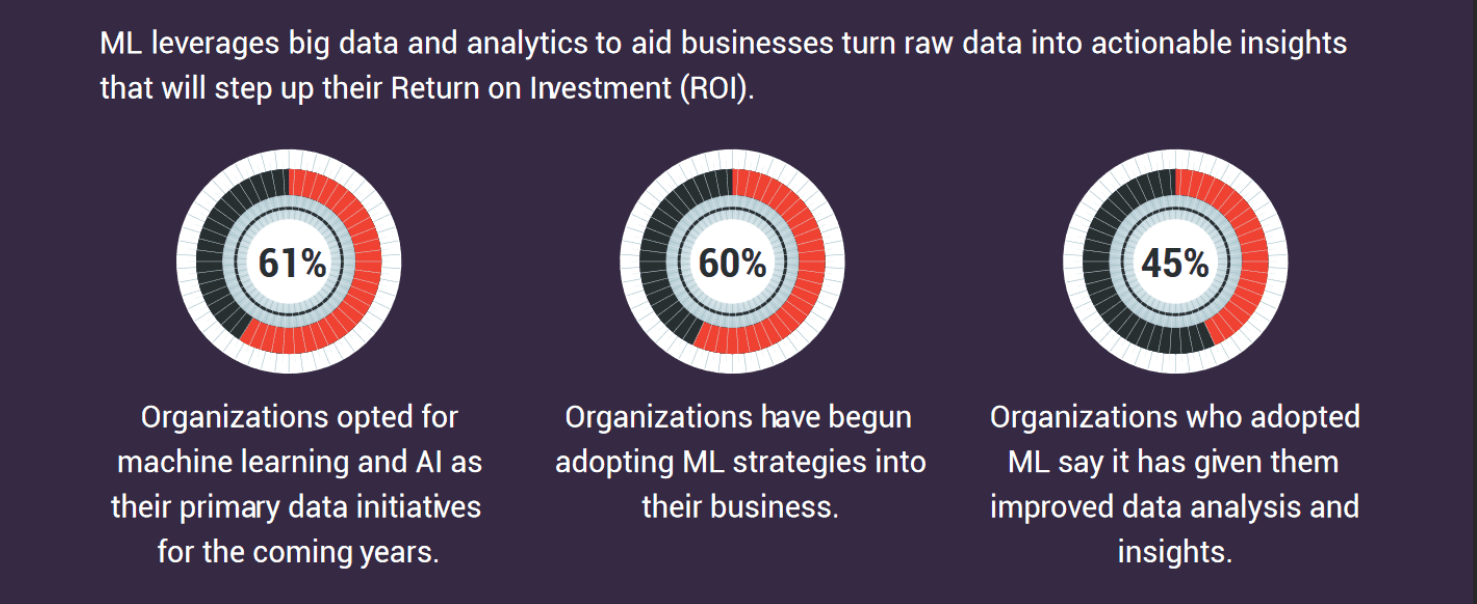Machine learning is changing the face of everyday life, science, and business. It is revolutionizing all industries, from advancing medicine to powering various cutting-edge technologies. Though Machine learning (ML) was a part of AI’s evolution until the 1970s, it evolved independently. It has become a chief response tool for cloud computing and eCommerce.
The goal of machine learning in business is to adapt to new data independently and make decisions and recommendations based on thousands of analyses. Machine learning enables systems to learn, identify patterns and make informed decisions with minimal human intervention.
Today, ML is a necessary aspect of modern business. It uses algorithms and neural network models to improve the performance of computer systems. Machine learning in business and manufacturing is enabling organizations to achieve notable strides. These strides include increased performance and efficiencies, improved processes, and enhanced security.
This article will discuss the benefits of machine learning in business and its use cases.
Remarkable Benefits of Machine Learning for Businesses
According to Fortune Business Insights, the global market size for machine learning in business is expected to grow to USD 209.91 billion by 2029, exhibiting a CAGR of 38.8% during the forecast period. ML has been and continues to scale operations tremendously. Across industries, ML has led to a boom in affordable data storage and faster and more reliable computational processing.
Here are six remarkable benefits of machine learning in business:
1. Automation for better decision-making
Most businesses find themselves wasting precious time sorting through duplicate and inaccurate data. Such businesses benefit from using the predictive modeling algorithms of ML in their processes. Such a process will understand duplicate inaccurate data and distinguish the anomalies. It enables the organization to avoid inaccurate reporting that can result in poor customer retention.
Instead, this will allow businesses to use their accurate database to detect wasted costs, missed opportunities for sales, and revenue capital. In addition, organizations can overcome challenges and risks that arise due to miscommunication or poor performance metrics. Thus, businesses can streamline their operations and improve decision-making which could be translated into better ROI.
2. Increased scalability with minimum expense
Semi-supervised machine learning algorithms can help organizations leverage useful insights from customer profiles and enable them to view their brands from customers’ perspectives. Doing so will equip organizations with relevant insights to build their brand by improving their products and services.
3. Predictive maintenance
Predictive maintenance that ML aids manufacturing firms’ power to follow best practices that lead to efficient and cost-effective operations. The historical and real-time data predict problems and stipulate strategies to solve those problems. Plus, workflow visualization tools can eliminate issues and unwanted expenses incurred due to those issues.
4. Financial analysis
ML can greatly assist as it gathers and analyzes large volumes of quantitative and accurate historical data. It is used for portfolio management, loan underwriting, fraud detection, and more.
5. Personalization
Using machine learning in business will allow organizations to know their customers better and provide them with a more personalized customer experience. Organizations no longer need to rely on guesswork because ML models can process different types of information collected from numerous sources and provide relevant data about their customers.
6. Cybersecurity
ML technologies can improve cybersecurity to solve cyberattacks once and for all. Empowered by ML, intelligent security programs can gather and process data about cyber threats and respond to them in real time. ML models can detect the slightest deviations in patterns and flag them. Or destroy an attack in its nascent stage.
Read more: Can Machine Learning Predict And Prevent Fraudsters?
Top Use Cases
Machine Language has made its mark across industries and found a place in many different applications. Here are some top use cases:
1. Enhanced social media features
Businesses can use machine learning algorithms to create attractive and effective social media features. For example, ML algorithms in Facebook enable it to identify and record a person’s activities. These activities include records of chats and the amount of time that person spends on each post. It uses this data to determine what kind of friends and topics may interest that person and accordingly make suggestions.
Read more: Why Time Series Forecasting Is A Crucial Part Of Machine Learning
2. Product recommendation
Product recommendation is an advanced application of machine learning techniques. It has been the most popular application of almost every eCommerce website today. This technique allows websites to track a consumer’s behavior based on their previous purchases, search patterns, and cart history. It enables the website to make apt product recommendations to that consumer.
3. Recognition
Image recognition is one of the most significant and notable ML and AI techniques. It is adopted further for pattern recognition, face detection, and face recognition.
4. Sentiment analysis
Sentiment analysis is a real-time ML application. It determines the emotion or opinion of the speaker or the writer. For example, a sentiment analyzer can detect the thought and tone of a written review or an email. It can analyze the review-based website, decision-making applications, and more.
5. Access control
Most large businesses are actively implementing ML models to determine the level of access an employee should be granted. This application of machine learning can ensure the security of the organization.
6. Bank Domain
Banks are using ML to prevent fraud and protect accounts from hackers. Machine learning algorithms determine what factors to consider in creating a filter to prevent an attack.
Read more: Machine Learning – Deciphering the most Disruptive Innovation
How Fingent Can Help with Deploying the Best of ML
Leveraging the capabilities of machine learning in business can open the door to many opportunities. It is wise for any organization to take advantage of ML rather than lag behind competitors. However, we understand if you have questions. That’s why Fingent is here to help you. We can deploy the best machine-learning models efficiently and smoothly.
As a partner, Fingent can work with your team as you take on digital initiatives for sustainable business growth. We enable our clients to make data-driven decisions by efficiently deploying machine learning in business. Our cost-effective services will save you a considerable amount of time and money.
Furthermore, we do not follow a one-size-fits-all strategy. We provide custom software development services that cater to your needs. Therefore, look no further if you are looking for a reliable, efficient IT partner to deploy the best machine-learning models.
Source link



Leave a Reply